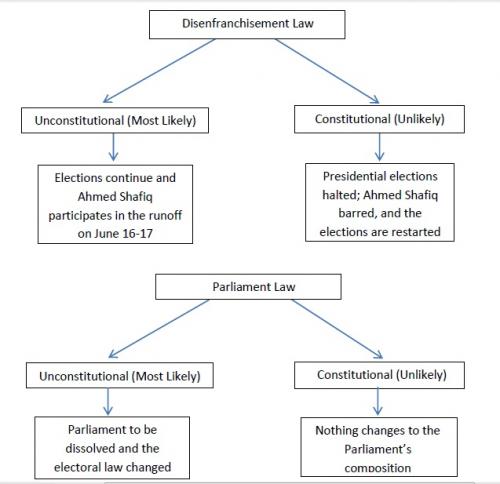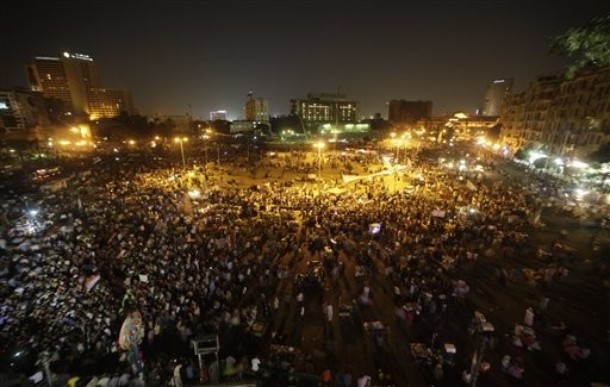
Egypt’s judiciary has emerged as a surprising new power-broker on the political scene, pushing the limits of its jurisdiction to rule on a number of polarizing and partisan disputes that have the potential to derail Egypt’s democratic transition just as it reaches the threshold of a transfer of power to civilian leadership. The judges – already struggling for their independence in the face of alleged interference from the executive branch — have come under intense scrutiny after a controversial decision to suspend the Constituent Assembly, then the trial against of NGO employees, and most recently the sentencing of former President Mubarak to a 25-year (life) prison term and acquitting his sons and six senior security officials. However, the most significant rulings that will impact Egypt’s democratic transition are still to come on June 14. Just two days before the scheduled presidential runoff between Ahmed Shafiq, Mubarak’s last prime minister, and Mohamed Morsi, the Muslim Brotherhood’s candidate, the Supreme Constitutional Court will review the constitutionality of both the Political Disenfranchisement and Parliament laws. The decisions of the court will have a tremendous effect on Egypt’s future and could prolong the rule of the Supreme Council of the Armed Forces (SCAF).
The SCAF as well as political factions have committed terrible mistakes that threaten to reverse the whole transitional process back to square one. The upcoming Supreme Court rulings are politically charged and raise difficult questions about the next steps. For instance, in the case of barring Ahmed Shafiq, will the entire presidential election be re-run from scratch, or will the race be limited to the 12 candidates who competed in the first round? On June 13, Hatem Bagato, the secretary general of the Presidential Election Commission (PEC), suggested that the latter would be the appropriate course of action, but the SCC has yet to decide. If the Parliament is deemed unconstitutional, how would Islamists react to losing control of the legislative branch? Parliamentary Speaker Saad al-Katatny has stated that Parliament will abide by the SCC’s ruling, yet he insists that Parliament cannot be dissolved until the next elected president takes office – if and when that happens. How would these rulings affect the already struggling Constituent Assembly tasked with writing the new Constitution? And finally how would the Egyptians react to the new changes, bearing in mind that it might lead to the extension of SCAF’s rule beyond the June 30 deadline?
Several scenarios have been argued by various constitutional and legal experts regarding the constitutionality of the discussed laws. Below I tried to offer a concise summary of these various possibilities based on some legal opinions.
Constitutional Court Scenarios for the Disenfranchisement Law:
- The disenfranchisement law is found to be unconstitutional. Ahmed Shafiq will be allowed to participate in the presidential elections runoff on June 16-17 (Most Likely)
- The SCC declines to review the constitutionality of the law, finding that the Supreme Presidential Elections Commission (SPEC) did not have jurisdiction to refer it in the first place. The disenfranchisement law is allowed to stand.
- The law is upheld and Ahmed Shafiq is banned from the runoff; the election is suspended and restarted (least likely)
Constitutional Court Scenarios for the Parliament Law:
- Law is ruled unconstitutional and Parliament is dissolved (likely option)
- Removing party-based MPs from the individual candidates’ seats they won, and re-running elections for those seats. (another likely option that would minimize conflict with the Islamist majority)
- Law is ruled unconstitutional but Parliament is allowed to serve out the remainder of its term before new elections are called.
- Law is upheld (least likely, in light of strong precedents for dissolving Parliament on constitutional grounds in 1984, 1987, and 1990)
The Four possible scenarios after the Constitutional Court rulings on June 14:
Scenario 1
- Disenfranchisement Law is ruled unconstitutional. The elections continue and Ahmed Shafiq participates in the runoff on June 16-17.
- The Parliament Law found to be unconstitutional. Parliament will be dissolved and the electoral law changed, leading to a new round of parliamentary elections.
Scenario 2
- Disenfranchisement Law is upheld (SCC declines to review the law because the electoral commission had no authority to refer it to the SCC in the first place). The Presidential election is halted; Ahmed Shafiq barred, and the election is restarted, probably including only the 12 candidates who participated in the first round.
- Parliament Law is upheld and the legislature is not dissolved.
Scenario 3
- Disenfranchisement Law ruled unconstitutional. The elections continue and Ahmed Shafiq participates in the runoff on June 16-17.
- Parliament Law is upheld and the legislature is not dissolved.
Scenario 4
- Disenfranchisement Law is ruled constitutional. The Presidential elections is halted; Ahmed Shafiq barred, and the elections are restarted.
- Parliament Law is ruled unconstitutional. Parliament to be dissolved and the electoral law changed.

Ahmed Morsy is a Ph.D. candidate at the School of International Relations, University of St. Andrews.
Photo Credit: AP
Image: 610x_81.jpg
